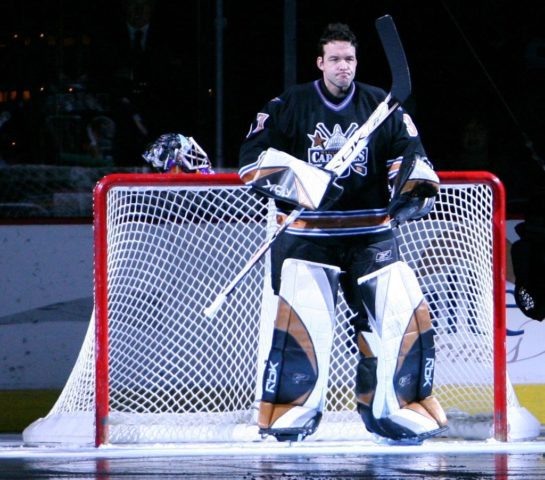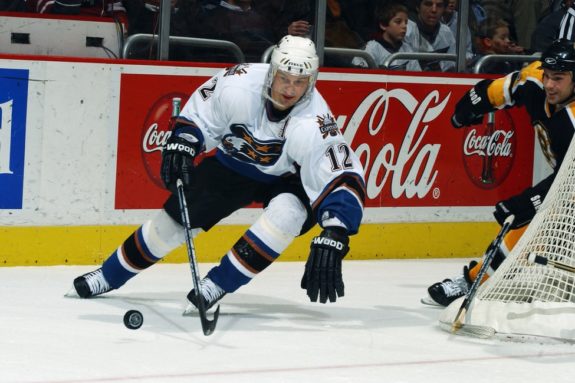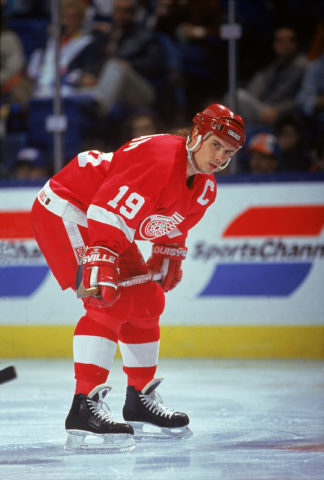Only twice have the Washington Capitals reached the Stanley Cup Final in their entire history. We all know of their most recent win back in the 2017-18 postseason, but many hockey fans have forgotten that a Capitals squad over 20 years ago had a chance to win the first championship in franchise history but fell short in doing so.
Oh, the late 1990s. I was only an infant, the movie Titanic just came out and broke box office records, and for some reason, the Furby was the hottest toy on the market regardless of how creepy they were. Not only a big year for pop culture, but the 1997-98 season was also a big year for the NHL.
A Big Year For the League
The league approved four expansion teams in Nashville, Minnesota, Atlanta, and Columbus, and it was the last season that the league used their classic four-division system to a new six-division geographical system. It was also the last year the “FoxTrax” puck detecting system was used on TV, a failed idea television execs thought would help promote the sport to the lesser-knowing fan who had trouble locating the puck during a game.

At the start of the 1997-98 season, the Capitals weren’t intended to become contenders to reach the Stanley Cup Final. They were a well-aged team with a nice combination of veteran and developing talent, but compared to top tier teams in the league they weren’t touted as anything special. Captained by 37-year old Dale Hunter, the core lineup of Peter Bondra, Adam Oates, and defenseman Calle Johansson offered a great mix of point production and veteran presence.
Their developing players were also proving themselves like 22-year-old Richard Zednik and 23-year-old Sergei Gonchar. They were producing at a reasonable rate considering their age, both finishing top-10 in point production for the Capitals that season. Starting goalie Olaf Kolzig also impressed during the regular season with a record of 33-18-10 in 64 games.

The Capitals finished the 1997-98 regular season with a 40-30-12 record, placing them third in the Atlantic Division and fourth in the Eastern Conference. The team was ranked first in penalty kill percentage (PK%) at 89.2, fifth in save percentage (SV%) .912, and sixth in total wins compared to all teams that season.
The Perfect Storm Leading to the Stanley Cup Final
When the postseason came around, their placement in the bracket sprinkled with a slight dash of luck, gave the Capitals a significantly higher chance of making it through the playoffs. They were middle of the pack in the East and ended up facing the fifth seed Boston Bruins in the Eastern Conference Quarterfinal, beating them in six games. Going into the Eastern Conference Semifinal, the Capitals had no idea what to expect.
In this time frame, one of the teams to beat was the New Jersey Devils, who finished the regular season boasting a 48-23-11 record, earning in first place in the Eastern Conference while placing top five in almost every category. They were a true perennial powerhouse of a team. Little did they know entering the playoffs, a young, eighth seed team from Ottawa crashed the party, eliminating the Devils in Game 6 of the first round.
Since the Senators did all the dirty work, they were sore and tired from their series with the Devils. It was now time for the Capitals to come in the semifinal and pick up the scraps, taking advantage of an exhausted Ottawa team. Beating the Sens in five games in the Eastern Conference semifinal, the only team that stood between the Capitals and the Stanley Cup Final were the Buffalo Sabres.
The Sabres weren’t fully tested in the playoffs, trouncing Philadelphia in five games and sweeping Montreal in the Eastern Conference Semifinal. The Eastern Conference Final ended with the Sabres succumbing to the Capitals in six games. No series in the Eastern Conference went to seven games in the 1997-98 postseason.
The Capitals improved their offence throughout the postseason. They finished second in goals and had the best save percentage out of all teams. Kolzig stood on his head, posting a 1.95 goals-against average (GAA) and a .941 SV%. The real test, however, awaited them in the Stanley Cup Final.
A Battle-Tested Opponent
Where do I even start when talking about the Detroit Red Wings from this era? They finished the season with a record of 44-23-15, placing third in the Western Conference. Led by Steve Yzerman, Nicklas Lidstrom, and Brendan Shanahan, they had a strong core with great depth going through the roster both offensively and defensively. Coming off a Stanley Cup victory the year before, they were ready to continue their run regardless of who was in their way, and that’s precisely what they did.

Game 1:
At home, the Red Wings scored two goals within two minutes of each other. Even though there was a last-ditch effort by the Capitals, the final score was 2-1 in Detroit’s favor.
Game 2:
With a 4-2 lead heading into the third period, Capitals forward Esa Tikkanen misses a late opportunity to seal the game. The Red Wings rally back to tie the game, and the Capitals lose in overtime, 5-4.
Game 3:
The Red Wings stun the Capitals faithful within the first 35 seconds of the game to take an early lead. The Capitals eventually tie, only to have the Red Wings stun the home team at the end of the third period, 2-1.
Game 4:
The Red Wings played dominantly throughout to win the game 4-1, ultimately sweeping the Capitals to win the Stanley Cup.
Looking Forward…
After getting swept in the Stanley Cup Final, it took the Capitals another 20 years to come back and finally win the most storied award in all of professional sports.
The Capitals have had great teams over the years, but were never able to win a Stanley Cup until their victory in 2018. Now with a championship win under their belts, who knows what’s in store for the next 20 years of hockey in the nation’s capital.